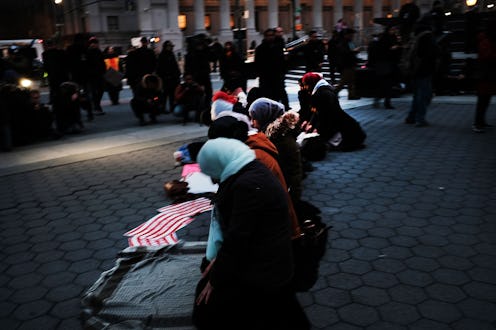
A new report from the Center for the Study of Hate & Extremism at California State University, San Bernardino shows that hate crimes rose by 23.3 percent in 2016 across nine major metropolitan areas. Crimes against LGBTQ+ people and Muslims accounted for most of the spike. The data was compiled by Brian Levin, a criminal justice professor and researcher at the university, who largely attributes the increase to Donald Trump's election as president.
We saw a hate crime wave following the election, which was widely speculated to be a result of perpetrators feeling emboldened enough by Trump's rise to power to act out their long-simmering aggressions toward marginalized populations. What's disturbing is not only 2016's significant spike in hate crimes over 2015, but also that we had previously been enjoying a steady decrease in hate crimes over the last decade.
New York City saw most individual hate crimes of the nine cities from which Levin collected and analyzed police reports, with 380 incidents — a 24 percent increase from 2015. Washington DC, however, experienced the most hate crimes per capita with a staggering 62 percent increase, to 107 reports, since 2015. Other cities included in the report were Chicago, Philadelphia, Montgomery County, MD, Columbus, OH, Seattle, Long Beach, CA, and Cincinnati. Levin collected a total of 1037 hate crime reports for 2016.
In addition to perpetrators of hate crimes feeling emboldened by Trump's election and his now politically-sanctioned antagonism towards marginalized groups, Levin says that victims have been feeling more motivated in the current political climate to report crimes because they know they aren't the only ones being targeted. This supports the common practice of trauma survivors to downplay their experience out of shame, believing that other people "have it much worse." As violent and extreme hatred of marginalized groups gains more and more media coverage, victims begin to believe that they have a responsibility to report their incidents because they are not alone — and, indeed, someone else might get hurt much worse than them if they don't.
At odds with an increase in hate crime reports is the fact that many marginalized people — especially in LGBTQ+ and Muslim communities — are also actively committed to criminal justice reform. Activists know that people of color, particularly men of color, suffer disproportionate incarceration rates and they work tirelessly to devise alternative community strategies for addressing crime that don't involve going to the police. It creates a complicated dynamic for victims of hate crime who may desire justice, but strongly disapprove of our justice system as it stands.